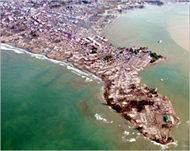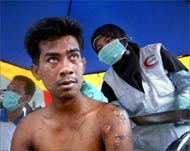US military aid role a first in Indonesia
American navy helicopters and transport planes have begun ferrying aid supplies to Aceh province six days after a tsunami slammed into the coast killing tens of thousands of people.

In a groundbreaking piece of diplomacy, US soldiers will for the first time touch down on Indonesian soil in an operational capacity.
Australian military aircraft have been involved in relief work in Aceh since mid-week, joining small Malaysian, Singaporean and New Zealand contingents.
The aircraft carrier USS Abraham Lincoln is off the north shore of Sumatra where upwards of 80,000 people are believed to have died.
“I can confirm that 10 US navy Seahawk helicopters will begin humanitarian operations in Aceh province today,” said USAid’s Michael Bok.
“The helicopters were in Medan on Friday. A joint coordinating meeting between American, Australian and Indonesian military organisations was held at that time to coordinate our efforts.”
Aid convoy
US helicopters will ferry desperately needed aid supplies to the west coast of the province which was the worst hit, Bok said. Four Australian defence force helicopters will do the same along the east coast.
|
“It is chaotic at the moment. In most areas the civil administration no longer exists; the health providers are dead” Gordon Weiss, |
Dozens of communities are believed to have been wiped out when a magnitude 9.0 earthquake 25km offshore spawned a 10m-high tsunami that crashed on to the coast.
“The situation on the west coast is extremely serious,” says Unicef’s Gordon Weiss.
“We need to get aid in there as soon as possible but it is chaotic at the moment. In most areas the civil administration no longer exists; the health providers are dead.”
Sensitive diplomacy
Eyewitnesses returning from the west coast city of Muelaboh say upwards of 80% of the city of 50,000 is now buried under mud and debris. No accurate tally of the dead there has been made but there are fears more than half the population may have perished.
 |
|
Meulaboh was all but destroyed |
The presence of foreign troops on Indonesian soil is a sensitive issue. The nation with the largest Muslim population on earth, Indonesia was a staunch Cold War ally of the US. The collapse of the Suharto regime in 1999 introduced a new era of openness within Indonesia and public criticism of both the new government and the US has grown.
Post-9/11 American foreign policy in the Middle East has been a lightning rod for criticism around the Muslim world and Indonesia is no exception.
While many of the country’s estimated 200 million Muslims practice a brand of Islam infused with pre-Islamic Buddhist and Hindu beliefs, the population is overwhelmingly opposed to the American intervention in Iraq.
Frequently rocky relations with Australia reached a new low when Indonesia’s southern neighbour lead a UN peacekeeping mission in the former Indonesian province of East Timor after the 800,000 residents of the former Portuguese colony voted for independence in a UN-sponsored referendum. Many Indonesians believe their southern neighbour betrayed them.
A hardcore group launched a series of anti-Western attacks in Indonesia, beginning with the bombing of a nightclub on the resort island of Bali in 2002 that claimed more than 200 lives, many of them foreign tourists. Since that time, truck bombs have exploded outside an American-owned hotel and the Australian embassy in the capital Jakarta.
Welcome assistance
Reaction was generally positive to the news of an American presence.
 |
|
A wounded man gets medical |
“Praise God, they are coming to help us,” said Munajar, a Banda Aceh clerk who like many Indonesians uses only one name. “We have been waiting for the international community to assist us and now they have come.”
Twenty-one-year old student Marrisa, who registers newly displaced people arriving at a local mosque was hopeful the foreign assistance will stave off a humanitarian disaster.
“So far the Indonesian government has not been able to deliver the aid quickly,” she said. “Hopefully now we will receive the food and medicine we need to save these people.”
Legal requirements
Not everyone was so enthusiastic.
“The Americans have to understand our culture here,” said Hilmy Bakar Almascaty, vice-chairman of the Jakarta-based Islamic Defenders Front, which is mobilising relief efforts of its own.
“If they are not sensitive to local issues then there will be problems. If American women come to Aceh, they must wear dilbab for example. There is Sharia law in Aceh and that is what is dictated.”
USAid’s Bok said it was unlikely US service personnel would adhere to a Muslim dresscode.
“I don’t think the practice of Islam in Aceh is such that it forces all people to wear dilbab,” said Weiss. “This is not Saudi Arabia.”
In addition to the helicopters, American forces have committed six C-130 transport planes to the relief effort. Four Australian aircraft have been flying supplies between Banda Aceh since Tuesday. Both nations are flying C-130 transport planes on a regular run between Medan and Band Aceh.